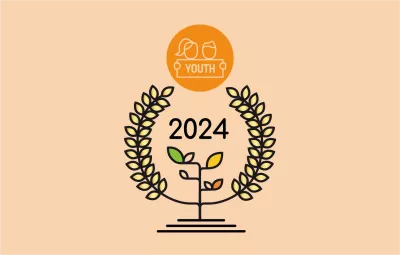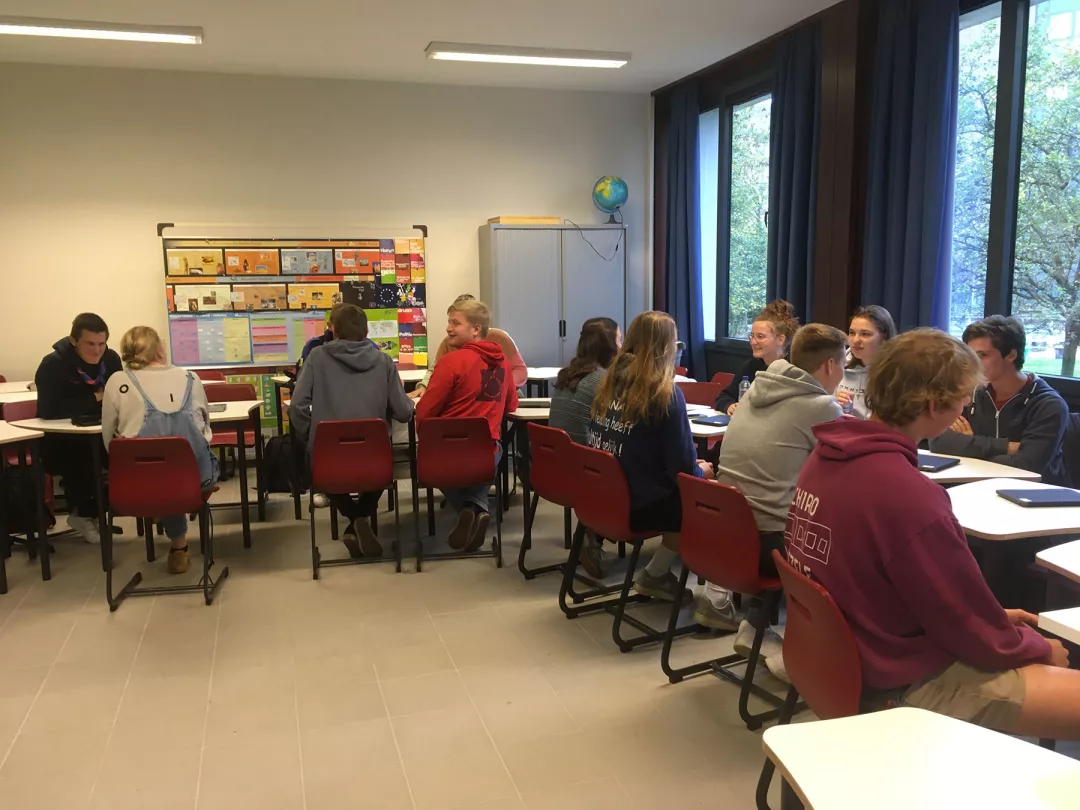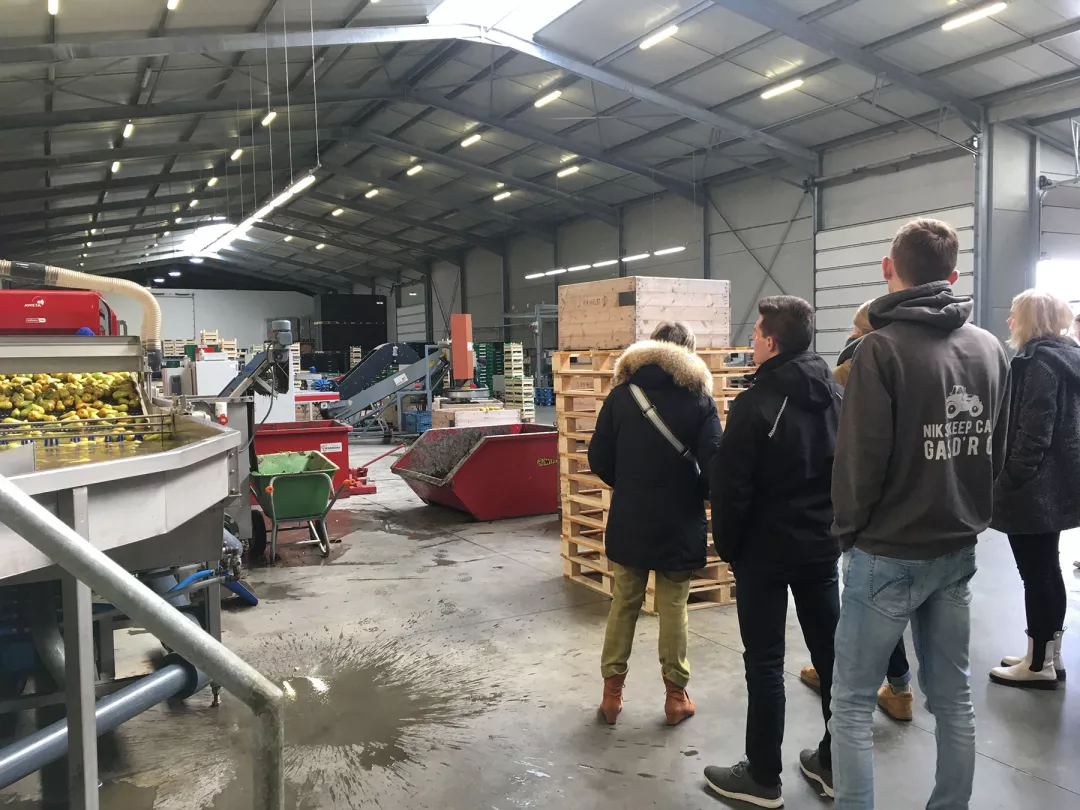General information
RDP Priority
- P2. Competitiveness
RDP Focus Area
- 2A: Farm’s performance, restructuring & modernisation
RDP Measure
- M16: Cooperation
Beneficiary type
- Operational group
Summary
Research shows that the mental health of farmers and horticulturalists is under great pressure, but strengthening 'mental health literacy', particularly by increasing knowledge and improving health skills to take control of mental health, can support them.
The education system is an important setting for health prevention and influencing mental health literacy. An EIP-AGRI Operational Group has developed a mental health literacy educational trajectory for future farmers and horticulturalists in Flemish higher education. Via co-creation sessions, it has examined how the existing happiness triangle can be used to offer future farmers and horticulturalists tools to take their mental well-being into their own hands.
A course is designed, consisting of ready-to-use teaching materials and magazines with information, exercises and testimonials from farmers. This trajectory was tested in two assembled groups of students, with feedback monitored, and the sessions then adapted and adjusted.
The guidelines for the developed track and all related materials are available to all courses in higher agricultural education in Flanders. High schools which want to get started with the educational trajectory can download all the material on the website or request a ready-to-use package from BOEK (Boeren Op Een Kruispunt - Farmers at a crossroads).
Results
- Eight group sessions focusing on theory, exchange and practice.
- 24 environmental interventions to make the concept and importance of mental well-being visible and present in the context in which young farmers find themselves, increasing awareness, self-reflection and normalising coping with their well-being.
- Four magazines containing exercises, quotes and explanations centred on three building blocks and the orange sphere of the happiness triangle.
- All students from agricultural and horticultural disciplines can benefit from the content and exercises that are offered within the education trajectory.
- Since the material is available online, any farmer struggling with mental well-being can download the magazines and get started with the material, with support available if necessary.
- Co-creative process: involvement of various stakeholders (educational, agricultural, health/prevention).
- Content and exercises promote awareness, critical thinking, discussion and understanding of one’s own situation and that of others.

Promoter
Vlaams instituut Gezond Leven*
* The Project promoter/beneficiary is an EIP-AGRI Operational Group ©
Funding
Total budget: 83 325 (EUR)
RDP support: 74 993 (EUR)
Private/Own funds: 8 332 (EUR)
Context
A report showed that life satisfaction among farmers dropped from 7.5 out of 10 in 2012 to 7.1 in 2017, with a further decline since. In 2020, the Flanders Research Institute for Agriculture, Fisheries and Food (ILVO) conducted a study on farmer stress and mental well-being. The findings revealed that 48% of farmers felt mentally exhausted by their work and 42% reported that their work negatively impacted their social life. The research also demonstrated that much is expected of farmers and horticulturalists. It is a profession with many challenges and uncertainties, and also a culture of silence. Being concerned with mental well-being is seen as soft and dealing with difficulties is often solved by simply working even harder (44% of those surveyed). There were clear opportunities here for a reversal of this social norm.

The project mapped all those needs and organised a structured conversation with consultive, advisory and focus groups. The developed trajectory offers young (student) farmers and horticulturalists support and tools to be aware of their own mental well-being and that of others. Increasing mental health literacy in a structured and preventive way strengthens mental well-being and protects them from difficulties that come their way.
The educational trajectory contains a guideline for the lecturer and ready-to-use media and material that can be delivered in one or more sessions. The content and exercises allow students to discuss different areas of mental well-being and exchange experiences, and arms young farmers and horticulturalists against possible setbacks.
Objectives
First and foremost, the project needed to identify the well-being needs of young farmers and horticulturalists. After that, the priority was to develop an innovative mental well-being educational trajectory in Flemish higher education for all students, future farmers and horticulturalists.
In parallel, it was important to raise awareness and involve young farmers in working on their own mental well-being and that of others, to offer support and tools to strengthen mental well-being and positive mental health, and to increase networking.
In addition, the project hoped to provide visibility for farmers and horticulturalists and put them in a more positive light.
Activities
The project commenced with a needs assessment, mapped out by the Operational Group and based on earlier research by the ILVO. The content of the synthesis was reviewed using a questionnaire and presented to the consulting and advisory group, and a focus group with young farmers and horticulturalists.

The next step was the development of the educational trajectory. Gezond Leven (Healthy Living) worked out the outline, and then this framework was checked with the Operational Group, the consultive and advisory board, and the focus group and was tested in the target group. An assembled group of 15 students (seven female and eight male) from Odisee high school tested four sessions during the academic year 2022-2023. The aim was to develop an educational track that could be used during their three-year course. Additional content was elaborated for each component of the existing happiness triangle. The trajectory was enhanced and expanded from four to eight sessions. Its final shape was given in September 2023 thanks to a well-structured test and qualitative feedback from the lecturer and the students, and feedback from another focus group.
In total, eight group sessions, 24 environmental interventions and four magazines were developed. The purpose was to give students tangible tools while also promoting continuity of learning and bridging the gap between life at school and life alongside and after school.
This was followed by the dissemination and implementation phase. Various stakeholders were informed and consulted in advance. Gezond Leven then took part in a poster exhibition at a network event of the Flemish Rural Network and gave two active workshops to explain the goals, process and future vision. Heads of higher education received an informative email and were offered the opportunity to talk in person about the approach to the educational trajectory, as well as to download and use the guidelines and materials. Various stakeholders were invited to a presentation and press event, while all partners of the Operational Group have an information page about the project on their own website.
All material and information can be found and downloaded on the Gezond Leven website.
Main results
Eight group sessions were held, focusing on theory, exchange and practice. There were also 24 environmental interventions to make the concept and importance of mental well-being visible and present in the context in which young farmers find themselves, increasing awareness, self-reflection and normalising coping with their well-being. Four magazines were also produced, containing exercises, quotes and explanations, centred on three building blocks and the orange sphere of the happiness triangle.
All students from agricultural and horticultural disciplines can benefit from the content and exercises that are offered within the education trajectory. Furthermore, since the material is available online, any farmer struggling with mental well-being can download the magazines and get started with the material, with support available where necessary.
The project fostered a co-creative process, with the involvement of a wide variety of stakeholders from the fields of education, agriculture and health and prevention. The collaboration between various partners and stakeholders created a bridge between the agricultural sector and mainstream offerings around mental health. A number of partnerships were established throughout the project between those various fields to align theory, content and practice.
On a broader level, the content and exercises promote awareness, critical thinking, discussion and understanding of one’s own situation and that of others.
Key lessons
One of the major plus points was the collaboration between agriculture, education, and health/prevention to align theory, content and practice. Indeed, all relevant stakeholders were involved throughout the process.
A real source of satisfaction for the project was the representation of the voice and vision of a cohort, be it farmers, horticulturalists or students, through sharing experiences during sessions of the educational trajectory.
The project was active on social media, participated in environmental interventions, and shared experiences during presentations and with the press.
Overall, a belief emerged among all stakeholders that this process can create more happiness by being enthusiastic about opportunities, through support among stakeholders and a shared positive vision of the future.
Stefanie Verduyn

